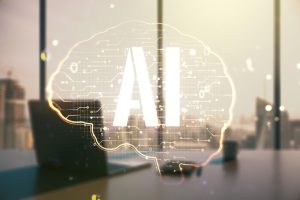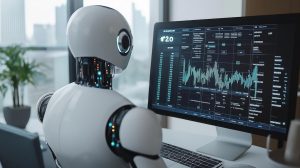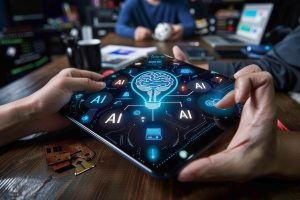Artificial Intelligence (AI) has already made a profound impact on the business world, transforming industries, automating processes, and providing data-driven insights that enable more informed decision-making. As AI technology continues to evolve, businesses must prepare for even greater changes in the coming years. The Future of AI is poised to revolutionize everything from customer service to supply chain management, from marketing strategies to product development.
By 2030, AI is expected to become even more integrated into the fabric of business operations, delivering unprecedented efficiency, accuracy, and innovation. This article explores the key trends and advancements we can expect in the Future of AI in business, how these developments will shape industries, and what organizations need to do to stay competitive in this AI-driven world.
The Current State of AI in Business
AI’s Role in Today’s Business Landscape
AI has already become a valuable tool in many sectors, including healthcare, finance, manufacturing, and retail. Businesses use AI for tasks like data analysis, customer service, fraud detection, and even creative processes like content generation. Companies that have embraced AI are seeing substantial benefits, such as reduced costs, improved efficiency, and enhanced customer satisfaction.

- Automation: AI-powered systems automate routine tasks, freeing employees to focus on more strategic activities.
- Data-Driven Decision-Making: AI provides deep insights by analyzing vast amounts of data, helping businesses make more informed decisions.
- Customer Service: AI-driven chatbots and virtual assistants are enhancing customer service by providing instant responses and personalized support.
The Growth of AI Adoption
According to a report by McKinsey, 50% of companies have integrated AI into at least one function, and this number is expected to rise dramatically by 2030. The Future of AI will see even broader adoption as technology becomes more accessible and easier to implement across industries.
The Future of AI: Key Trends to Watch by 2030
AI-Driven Automation at Scale
One of the most significant shifts in the Future of AI is the widespread adoption of AI-driven automation across industries. By 2030, AI systems will automate not only routine tasks but also more complex processes that currently require human intervention.
- End-to-End Automation: AI will be used to automate entire workflows, from data entry to decision-making, without human input. This will drastically reduce operational costs and improve efficiency.
- Hyperautomation: A term gaining popularity, hyperautomation refers to the combination of AI, machine learning, and robotic process automation (RPA) to automate business processes at a much larger scale.
Impact on Jobs and the Workforce
As AI-driven automation continues to advance, there are concerns about its impact on jobs. However, while AI will automate many tasks, it will also create new job opportunities. The Future of AI will require workers to upskill and adapt to more strategic roles that focus on overseeing and managing AI systems rather than performing routine tasks.
AI in Decision-Making: From Data to Insights
In the Future of AI, businesses will increasingly rely on AI for decision-making, using advanced algorithms to analyze data and predict trends with greater accuracy. AI will move from being a tool for data analysis to becoming an essential partner in strategic decision-making.
- Predictive Analytics: AI will analyze historical data and predict future outcomes with high accuracy, allowing businesses to make proactive decisions. Predictive analytics will be particularly useful in industries like finance, healthcare, and retail, where anticipating market trends and consumer behavior is crucial.
- AI-Driven Business Intelligence: AI will become a core component of business intelligence platforms, providing real-time insights that help organizations stay competitive.
Case Study: AI in Financial Forecasting
By 2030, AI will dominate financial forecasting. In the Future of AI, financial institutions will rely on AI to predict market trends, assess risks, and optimize investment strategies. AI-driven models will help businesses make data-informed decisions, allowing them to capitalize on opportunities and mitigate risks more effectively.
AI in Customer Experience: Personalization and Beyond
The Future of AI will reshape the way businesses interact with customers, providing hyper-personalized experiences at every touchpoint. AI will go beyond chatbots and virtual assistants, offering deep personalization that meets individual customer needs and preferences in real time.
- Personalized Marketing: AI will analyze customer data to create highly targeted marketing campaigns. Personalized recommendations and product suggestions will become the norm, leading to higher customer engagement and retention.
- AI-Powered Customer Support: AI will provide instant, accurate responses to customer inquiries across various channels, improving customer satisfaction and reducing support costs.
- Emotion AI: A major advancement in the Future of AI is the rise of emotion AI, which will analyze customer emotions and adjust responses accordingly, providing more empathetic and personalized interactions.
Case Study: AI-Driven Personalization in E-Commerce
In the Future of AI, e-commerce platforms will utilize AI to offer hyper-personalized shopping experiences. By analyzing customer behavior, preferences, and past purchases, AI will suggest products in real time, leading to increased sales and higher customer satisfaction. This level of personalization will give businesses a competitive edge in the crowded digital marketplace.
AI in Supply Chain Management: Efficiency and Resilience
Supply chain management is another area where the Future of AI will have a significant impact. AI-driven solutions will optimize supply chains, enhancing efficiency, reducing costs, and improving resilience to disruptions.
- AI-Optimized Logistics: AI will analyze traffic patterns, weather conditions, and other variables to optimize delivery routes and reduce shipping times.
- Predictive Maintenance: AI will predict when equipment and machinery require maintenance, minimizing downtime and reducing costs.
- Real-Time Supply Chain Visibility: Future of AI will provide real-time insights into every stage of the supply chain, allowing businesses to address potential issues before they become major problems.
Case Study: AI in Manufacturing Supply Chains
By 2030, the Future of AI will enable manufacturers to create fully automated and AI-driven supply chains. AI-powered robots will handle everything from assembly to packaging, while predictive analytics will optimize inventory management and reduce waste. This will lead to more sustainable and cost-effective manufacturing processes.
AI in Marketing: The Rise of Intelligent Campaigns
Marketing will undergo a transformation in the Future of AI, with AI driving intelligent, data-driven campaigns that deliver better results. AI will analyze consumer behavior, market trends, and competitor strategies, enabling marketers to create more effective and targeted campaigns.
- AI-Powered Content Creation: AI will generate personalized content, including product descriptions, blog posts, and social media updates, tailored to each individual customer.
- Dynamic Ad Targeting: AI will automatically adjust ad campaigns in real time based on consumer interactions, ensuring that marketing efforts are always optimized for maximum impact.
- Voice Search Optimization: As AI-powered voice assistants become more prevalent, optimizing content for voice search will be a crucial aspect of digital marketing strategies.
Case Study: AI in Content Marketing
By 2030, AI will play a major role in content marketing. AI-driven content generation tools will create personalized articles, videos, and infographics based on audience preferences. This will allow businesses to deliver highly relevant content at scale, helping them engage with customers more effectively.
AI and Ethical Considerations
While the Future of AI holds great promise, it also raises important ethical questions. As businesses increasingly rely on AI for decision-making and customer interactions, ensuring that AI is used responsibly is crucial.
- Bias in AI: AI algorithms can sometimes perpetuate biases present in the data they are trained on. Businesses must ensure that AI systems are designed and trained with fairness and inclusivity in mind.
- Data Privacy: As AI systems process vast amounts of data, protecting customer privacy is a top concern. Businesses must comply with data protection regulations and implement robust security measures to protect sensitive information.
- Transparency: It is essential that businesses are transparent about how they use Future of AI, ensuring that customers understand how their data is being used and how decisions are being made.
Case Study: Ethical AI in Healthcare
In the Future of AI, healthcare providers will rely heavily on AI for diagnostics, treatment recommendations, and patient care. However, ensuring that AI systems are unbiased and transparent will be critical to maintaining trust. Ethical considerations will play a major role in the development and deployment of AI in healthcare, ensuring that AI delivers equitable outcomes for all patients.
Preparing for the Future of AI in Business
Upskilling the Workforce
As the Future of AI continues to shape business operations, the demand for AI skills will grow. Businesses must invest in upskilling their workforce to ensure that employees are equipped to work alongside AI systems and contribute to AI-driven innovation.
- AI Education and Training: Organizations should provide training programs to help employees develop AI-related skills, such as data analysis, machine learning, and AI ethics.
- Collaborative AI: In the Future of AI, humans and machines will work together in collaborative environments. Employees will need to develop skills that complement AI capabilities, such as critical thinking, creativity, and emotional intelligence.
Investing in AI Infrastructure
To fully capitalize on the Future of AI, businesses must invest in the right infrastructure. This includes advanced computing resources, data storage systems, and AI software solutions that can support large-scale AI deployments.
- Cloud-Based AI Solutions: Cloud computing will play a vital role in enabling businesses to scale Future of AI applications and access powerful AI tools without the need for extensive on-premise infrastructure.
- AI-Ready Data Systems: AI relies on data, so businesses must ensure that they have robust data collection, storage, and management systems in place.
Developing an AI Strategy
The Future of AI will require businesses to develop comprehensive AI strategies that align with their long-term goals. This includes identifying key areas where AI can deliver value, ensuring ethical AI deployment, and building a culture of continuous innovation. By developing a strategic approach to AI, businesses can stay ahead of competitors and adapt to the rapidly evolving technological landscape.

Components of a Successful AI Strategy
- AI-Driven Objectives: Align AI initiatives with the broader goals of the organization. Define how AI can help achieve business objectives, whether it’s enhancing customer experiences, improving operational efficiency, or driving product innovation.
- Data as a Strategic Asset: Data is the fuel for AI. Businesses must prioritize data collection, management, and analysis. Ensuring the quality and accuracy of data is critical to AI success.
- Scalable AI Systems: Invest in AI platforms that can grow with the business. Scalable AI solutions ensure that businesses can expand AI applications across various departments and functions as the need arises.
- AI Governance: Establish clear governance structures to ensure ethical and responsible AI deployment. This includes frameworks for data privacy, bias mitigation, and transparency in AI decision-making.
The Role of AI in Transforming Key Industries by 2030
The Future of AI will reshape various sectors in ways that will fundamentally change how businesses operate. Each industry will experience AI innovations tailored to its specific needs, providing new opportunities for growth, efficiency, and market leadership.
AI in Healthcare: Precision Medicine and Patient Care
AI is already making waves in healthcare, and by 2030, it will play a critical role in enhancing patient outcomes through personalized care and predictive analytics. The Future of AI in healthcare will focus on:
- Precision Medicine: AI will analyze genetic data and patient histories to create highly personalized treatment plans, improving the accuracy and effectiveness of medical interventions.
- AI-Assisted Diagnostics: AI-powered tools will assist healthcare providers in diagnosing diseases with higher accuracy, especially in areas like radiology, pathology, and genomics.
- Remote Patient Monitoring: AI will enable healthcare providers to monitor patients in real-time through wearable devices, reducing hospital visits and improving overall care.
Case Study: AI in Cancer Treatment
By 2030, AI will revolutionize cancer treatment by providing more precise diagnostics and tailored therapies. Machine learning algorithms will analyze large datasets to identify patterns that indicate the best treatment options for individual patients. This level of personalization will dramatically improve survival rates and patient outcomes.
AI in Retail: Hyper-Personalization and Smart Stores
Retail will undergo a transformation in the Future of AI, with AI playing a pivotal role in delivering personalized shopping experiences, optimizing supply chains, and creating smarter stores.
- Hyper-Personalization: AI will analyze customer preferences and behavior in real-time, allowing retailers to offer highly personalized product recommendations and targeted promotions.
- Smart Stores: AI-powered retail stores will leverage technologies like computer vision and autonomous checkout systems to create seamless shopping experiences without the need for human staff.
- Inventory Optimization: AI will enable retailers to predict demand more accurately, reducing waste and ensuring that products are always in stock.
Case Study: AI in E-Commerce
In the Future of AI, e-commerce platforms will rely heavily on AI to enhance the online shopping experience. AI-driven recommendation engines will provide personalized suggestions, leading to higher conversion rates and increased customer loyalty. Additionally, AI will optimize pricing strategies by analyzing market trends and competitor pricing in real-time.
AI in Manufacturing: Smart Factories and Predictive Maintenance
Manufacturing will be one of the biggest beneficiaries of AI advancements. The Future of AI will enable smart factories, where AI and machine learning drive efficiency, reduce costs, and optimize production processes.
- AI-Driven Quality Control: AI systems will identify defects and optimize quality control processes, reducing waste and ensuring that products meet high standards.
- Predictive Maintenance: AI will predict when machinery and equipment need maintenance, preventing breakdowns and minimizing downtime.
- Supply Chain Optimization: AI will provide real-time insights into supply chain performance, allowing manufacturers to respond to disruptions more quickly and efficiently.
Case Study: AI in Automotive Manufacturing
By 2030, AI will be integral to the automotive manufacturing process. Smart factories will leverage AI to automate the assembly line, monitor quality control in real-time, and optimize inventory management. This will lead to faster production times, reduced costs, and higher-quality vehicles.
AI in Finance: Automation and Fraud Detection

The financial sector will see significant changes in the Future of AI, with automation, fraud detection, and AI-driven investment strategies taking center stage.
- Automated Trading: AI will analyze market data in real-time to make instant trading decisions, leading to more efficient and profitable investment strategies.
- Fraud Detection: AI will detect fraudulent activity more accurately by analyzing patterns and identifying anomalies in financial transactions.
- Customer Support: AI-powered chatbots and virtual assistants will provide personalized financial advice, improving customer service and satisfaction.
Case Study: AI in Wealth Management
In the Future of AI, wealth management firms will use AI to provide personalized investment advice to clients. AI algorithms will analyze clients’ financial goals, risk tolerance, and market trends to create tailored portfolios that optimize returns. This level of personalization will revolutionize the wealth management industry, attracting a broader range of clients.
AI in Energy: Optimizing Efficiency and Sustainability
The energy sector will leverage the Future of AI to optimize energy production, reduce waste, and support the transition to renewable energy sources.
- AI-Optimized Energy Grids: AI will analyze energy consumption patterns and weather forecasts to optimize the distribution of energy across grids, reducing waste and ensuring a more reliable supply.
- Predictive Maintenance for Energy Infrastructure: AI will predict when energy infrastructure, such as power plants and solar panels, need maintenance, ensuring that systems run efficiently with minimal downtime.
- AI-Driven Renewable Energy: AI will play a crucial role in optimizing the production and storage of renewable energy, helping to accelerate the transition to sustainable energy sources.
Case Study: AI in Solar Energy
By 2030, AI will help optimize the efficiency of solar panels by predicting weather patterns and adjusting energy output accordingly. AI-driven energy management systems will allow solar power plants to store excess energy during peak production times and distribute it during high demand periods. This will make solar energy more reliable and cost-effective, supporting the global shift toward renewable energy.
The Challenges of Implementing AI in Business
While the Future of AI presents immense opportunities for businesses, it also comes with its own set of challenges. Companies must navigate these challenges to successfully implement AI solutions.

Data Quality and Availability
AI relies on large amounts of data to function effectively. However, many businesses struggle with data quality issues, such as incomplete or inaccurate data, which can hinder AI performance.
- Data Silos: Many organizations have data stored in separate systems, making it difficult to access and integrate the data needed for AI.
- Data Privacy Concerns: As AI processes vast amounts of data, ensuring compliance with data protection regulations, such as GDPR, is critical. Businesses must implement robust security measures to protect sensitive customer information.
Skill Gaps in AI
The Future of AI will require businesses to have a skilled workforce capable of developing, deploying, and managing AI systems. However, there is currently a significant skills gap in AI expertise.
- Lack of AI Talent: There is a global shortage of professionals with AI skills, making it difficult for businesses to find the talent they need to implement AI successfully.
- Upskilling Employees: To bridge this gap, companies will need to invest in training programs to upskill their existing employees in AI-related fields, such as data science, machine learning, and AI ethics.
Ethical and Regulatory Considerations
As AI becomes more integrated into business processes, companies will need to address ethical concerns and comply with emerging regulations.
- Bias in AI Algorithms: AI systems can perpetuate biases present in the data they are trained on, leading to unfair outcomes. Businesses must take steps to ensure that AI is designed and deployed in a fair and unbiased manner.
- Regulatory Compliance: Governments around the world are introducing regulations to govern the use of AI, particularly in areas like data privacy and algorithmic transparency. Companies must stay up-to-date with these regulations to avoid legal issues.
Conclusion
The Future of AI is filled with opportunities for businesses to innovate, streamline operations, and provide better customer experiences. By 2030, AI will be deeply embedded in every aspect of business, from automating processes to driving strategic decision-making.
To capitalize on the Future of AI, businesses must start preparing today. This includes investing in AI infrastructure, upskilling employees, developing ethical AI practices, and creating a comprehensive AI strategy. Those that embrace AI and integrate it into their core business operations will be well-positioned to thrive in an increasingly AI-driven world.
As AI continues to evolve, businesses must remain agile and adaptive, ready to harness the power of AI to meet the demands of the future
The Next Frontier: Continuous AI Innovation Beyond 2030
As we look beyond 2030, it’s clear that the Future of AI will continue to push boundaries, offering even more advanced capabilities that will reshape industries and societies alike. The pace of AI innovation is unlikely to slow down, and businesses that fail to keep up may struggle to remain competitive in an AI-dominated landscape.
AI in Autonomous Systems
One of the most anticipated areas of AI development is the growth of autonomous systems. By 2030, we will likely see AI taking on more sophisticated roles in industries like transportation, manufacturing, and even retail. Autonomous vehicles, drones, and robots will become commonplace, offering solutions to logistical challenges, improving delivery times, and reducing labor costs.
- Self-Driving Cars: AI-powered autonomous vehicles will transform the transportation sector, enabling safer and more efficient travel. These systems will reduce traffic accidents, lower emissions, and provide accessible transportation options for individuals with disabilities.
- Autonomous Manufacturing: Factories of the future will be run by AI-powered robots, capable of handling everything from product assembly to quality assurance. These smart factories will operate around the clock with minimal human intervention, driving efficiency and productivity to new heights.
- AI in Retail Logistics: Retailers will deploy AI-driven drones and robots to manage inventory, fulfill orders, and deliver products directly to consumers. This will streamline the logistics process, enabling faster, more reliable deliveries.
AI and the Human-Machine Collaboration
The Future of AI will not only involve machines taking over repetitive tasks but also fostering deeper collaboration between humans and AI. This collaboration will unlock new possibilities for innovation and problem-solving, allowing humans to focus on more strategic, creative, and complex endeavors.
- Augmented Intelligence: Rather than replacing humans, AI will augment human capabilities by providing real-time insights and recommendations. For instance, AI will assist doctors in diagnosing diseases, marketers in crafting personalized campaigns, and financial analysts in making data-driven decisions.
- AI-Powered Creativity: In fields such as design, art, and music, AI will serve as a creative partner. It will generate ideas, analyze trends, and help humans push creative boundaries. For example, AI algorithms may suggest new product designs or assist artists in creating unique works of art.
- AI in Workforce Productivity: AI will enhance workforce productivity by automating routine tasks, freeing up time for employees to focus on strategic initiatives. AI-driven virtual assistants will manage scheduling, communication, and project management, enabling workers to achieve more in less time.
Ethical Considerations and the Evolving Role of AI
As AI becomes increasingly integrated into business and society, ethical considerations will become even more critical. The Future of AI will require a delicate balance between technological innovation and ethical responsibility.
- AI Ethics Frameworks: Companies will need to develop robust frameworks that guide ethical AI use, ensuring that AI technologies do not perpetuate discrimination, inequality, or bias. This will involve transparency in AI decision-making processes, as well as accountability for the outcomes of AI systems.
- AI and Workforce Displacement: While AI will drive efficiency and productivity, it may also lead to job displacement in certain sectors. Governments, businesses, and educational institutions must work together to address these challenges, ensuring that workers have access to retraining programs and new opportunities in AI-driven industries.
- AI in Governance and Regulation: As AI becomes more powerful, governments will play a critical role in regulating its use. Policymakers will need to establish guidelines that protect privacy, prevent misuse, and ensure that AI systems align with societal values.
Future AI Applications in Emerging Industries
As AI continues to advance, new industries will emerge, leveraging AI to solve complex challenges and create unprecedented value. The Future of AI will give rise to novel applications in areas such as space exploration, biotechnology, and environmental sustainability.
AI in Space Exploration
AI will play a key role in space exploration, helping to navigate spacecraft, analyze data from distant planets, and even establish human settlements on the Moon and Mars.
- Autonomous Spacecraft: AI-powered spacecraft will operate autonomously, making real-time decisions during missions to explore distant planets and moons. These systems will navigate through space, avoiding obstacles and collecting valuable scientific data.
- AI in Space Mining: By 2030, AI may be used to identify and extract valuable resources from asteroids, providing new materials for manufacturing and technology development on Earth.
- AI in Mars Colonization: As humanity prepares for long-term space exploration, AI will assist in building sustainable habitats on Mars, optimizing life support systems, and ensuring the safety of astronauts.
AI in Biotechnology
AI will revolutionize biotechnology, enabling breakthroughs in medicine, agriculture, and environmental sustainability.
- AI-Driven Drug Discovery: AI will accelerate the drug discovery process by analyzing vast datasets to identify potential treatments for diseases. This will reduce the time and cost required to bring new drugs to market, improving global health outcomes.
- AI in Genetic Engineering: AI will enable more precise genetic modifications, allowing scientists to develop crops that are resistant to climate change and diseases. This will contribute to global food security and agricultural sustainability.
- AI in Environmental Monitoring: AI-powered sensors and data analytics will help monitor ecosystems, track pollution, and predict environmental changes. These tools will support efforts to mitigate the impact of climate change and protect biodiversity.
Preparing for a Future Driven by AI
The Future of AI presents both exciting opportunities and significant challenges. Businesses, governments, and individuals must prepare for the profound changes that AI will bring.
For Businesses
To remain competitive, businesses must invest in AI research and development, build AI-friendly infrastructures, and create cultures that embrace technological change. Key steps include:
- AI Training and Upskilling: Companies must invest in AI education and training for employees at all levels, ensuring that their workforce is prepared to work alongside AI.
- AI Integration Across Departments: AI should not be confined to one department or function. Businesses must integrate AI across all aspects of their operations, from customer service to supply chain management.
- Collaboration with AI Startups: Partnering with AI startups can give established companies access to cutting-edge innovations and AI talent, accelerating the implementation of AI technologies.
For Governments
Governments have a crucial role in ensuring that the benefits of AI are shared widely and that ethical considerations are prioritized. Policymakers should:
- Create AI-Friendly Regulations: Governments must develop regulations that encourage innovation while protecting privacy, security, and fairness. This will involve balancing the need for oversight with the flexibility required for AI to flourish.
- Support AI Research and Development: Governments should invest in AI research, particularly in areas that address societal challenges, such as healthcare, education, and climate change.
- Reskilling Programs for AI-Displaced Workers: As AI transforms industries, governments must provide reskilling programs for workers displaced by automation, ensuring that they have opportunities to transition to new, AI-driven roles.
For Individuals
Individuals must stay informed about the Future of AI and its implications for their careers and daily lives. This means:
- Lifelong Learning: As AI reshapes industries, individuals must embrace lifelong learning to stay relevant in the workforce. This could involve acquiring new technical skills, such as data analysis and machine learning, or developing soft skills, such as creativity and critical thinking.
- Ethical Awareness: Individuals must advocate for responsible AI use, ensuring that AI technologies are deployed in ways that align with societal values and promote fairness.
- Adaptability: The rapid pace of AI innovation will require individuals to be adaptable and open to change. Embracing new technologies and being willing to work alongside AI will be key to success in the future job market.
The Future of AI is both thrilling and transformative, offering opportunities to revolutionize industries, solve global challenges, and improve the quality of life for people around the world. By 2030, AI will be an integral part of business and society, driving efficiency, innovation, and growth.
However, realizing the full potential of AI will require careful planning, ethical consideration, and a commitment to continuous learning. Businesses must develop robust AI strategies, governments must create supportive policies, and individuals must prepare for the changes ahead. Those that embrace AI and proactively adapt to the new landscape will be the leaders of the future, shaping a world where AI enhances human capabilities and fosters a more prosperous, equitable society.
The Future of AI is not just about technology; it’s about creating a better future for all. Whether through personalized healthcare, more efficient energy systems, or groundbreaking space exploration, AI will enable humanity to reach new heights, unlocking possibilities that were once thought impossible.

